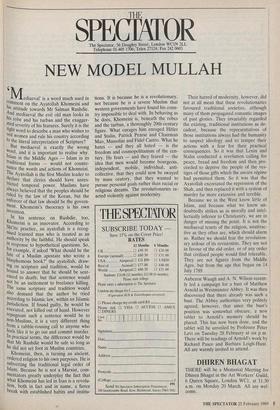SPECTATOR OR
The Spectator, 56 Doughty Street, London WC1N 2LL Telephone 01-405 1706; Telex 27124; Fax 242 0603
NEW MODEL MULLAH
ediaeval' is a word much used in
his on the Ayatollah Khomeini and nis attitude towards Mr Salman Rushdie. And mediaeval the evil old man looks in his robe and his turban and the exagger- ated severity of his features. Surely it is the right word to describe a man who wishes to veil women and rule his country according to the literal interpretation of Scripture? But mediaeval is exactly the wrong word, and it is important to realise why. Islam in the Middle Ages — Islam in its traditional forms — would not counte- nance the words and actions of Khomeini. The Ayatoa is the irst Mulim ader to declare thallth clericsf shoulds havele unres- rncted temporal power. Muslims have always believed that the peoples should be ruled by the law of the Koran, but the enforcer of that law should be the govern- ent. Khomeini's theocracy is his own Invention.
In his sentence on Rushdie, too, Khomeini is an innovator. According to Shi'ite practice, an ayatollah is a recog- nised learned man who is treated as an authority by the faithful. He should speak in response to hypothetical questions. So, for example, if asked 'What should be the fate of a Muslim apostate who wrote a blasphemous book?' the ayatollah, draw- ing on scripture and tradition, would be bound to answer that he should be sent- enced to death; but that sentence would not be an incitement to freelance killing. The same scripture and tradition would also demand that the author be tried according to Islamic law, within an Islamic Jurisdiction. If found guilty, he would be executed, not killed out of hand. However repugnant such a sentence would be to non-Muslims, it is a very different thing from a rabble-rousing call to anyone who feels like it to go out and commit murder. In practical terms, the difference would be that Mr Rushdie would be safe so long as he did not set foot in Muslim countries.
Khomeini, then, is turning an ancient, ordered religion to his own purposes. He is subverting the traditional legal order of Islam. Because he is not a Marxist, com- mentators greatly underplay the fact that What Khomeini has led in Iran is a revolu- tion, both in fact and in name, a fierce break with established habits and institu-
tions. It is because he is a revolutionary, not because he is a severe Muslim that western governments have found his coun- try impossible to deal with. In behaving as he does, Khomeini is, beneath the robes and the turban, a thoroughly 20th-century figure. What enrages him enraged. Hitler and Stalin, Patrick. Pearse and Chairman Mao, Mussolini and Fidel Castro. What he hates — and they all hated — is the freedom and cosmopolitanism of the cen- tury. He fears — and they feared — the idea that men would become bourgeois, independent, mobile, individual, anti- collective, that they could now be swayed by mass oratory, that they wanted to pursue personal goals rather than racial or religious dreams. The revolutionaries re- acted violently against modernity.
Their hatred of modernity, however, did not at all mean that these revolutionaries favoured traditional societies, although many of them propagated romantic images of past glories. They invariably regarded the existing, traditional institutions as de- cadent, because the representatives of those institutions always had the humanity to suspect ideology and to temper their actions with a fear for their practical consequences. So it was that Lenin and Stalin conducted a revolution calling for peace, bread and freedom and then pro- ceeded to deprive the people of the ves- tiges of those gifts which the ancien regime had permitted them. So it was that the Ayatollah excoriated the repression of the Shah, and then replaced it with a system of murder far more extensive and terrible.
Because we in the West know little of Islam, and because what we know un- doubtedly strikes us as morally and intel- lectually inferior to Christianity, we are in danger of missing the point. It is not the mediaeval tenets of the religion, unattrac- tive as they often are, which should alarm us. Rather we should fear the revolution- ary ardour of its revisionists. They are not in favour of the old order, or of any order that civilised people would find tolerable. They are not figures from the Middle Ages, but from the age that began on 14 July 1789.
















































 Previous page
Previous page